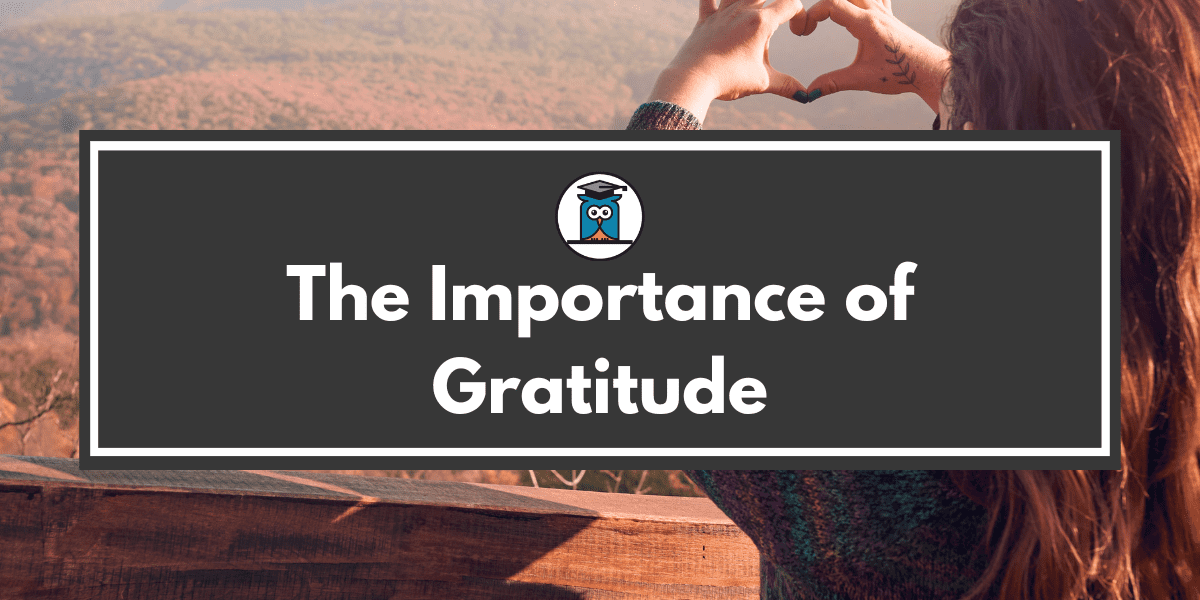Thanksgiving, like most holidays, is one of those occasions where you might be really excited—or completely overwhelmed. Or maybe—both. Maybe you spend it with your family; maybe you spend it with your cat; or maybe you spend it with your friends. Similarly, we all have different perceptions of Thanksgiving, its origins, and what it really means.
But there is one kind of collective understanding when it comes to this holiday—people are always talking about, you know, giving thanks.
And if you do take part in this—giving thanks—there are limitless possibilities for how you do it. Maybe you go around the dinner table and talk about what you’re thankful for. Or maybe you call every person for whom you’re thankful.
The thing is, giving thanks shouldn’t apply on this day and this day only. Practicing gratitude is a tool that can help every individual on this earth—and in so many ways.
And we’re going to look at the “selfish” ways in which gratitude can be valuable. By selfish, I mean ways in which gratitude can help YOU.
Despite some notions that we’ve societally conceived, gratitude is not just about showing others that you’re a “good person.” It’s also about giving thanks to yourself.
Practicing gratitude can literally make you happier
That’s right. Gratitude isn’t just for show; it can actually change your insides. Don’t get me wrong—you can’t simply think to yourself, I am grateful for my health, snap your fingers, and expect to be happy as a clam. You’ve got to work at it a little.
The thing is, happiness isn’t just a passing feeling of elation. It’s more than that—it’s a long-lasting state of contentment. Essentially, the level of satisfaction you feel about your life. And holding that inside of you means that in a fleeting moment of chaos or panic, your overall happiness will help you push through.
By developing a gratitude practice, you can increase your happiness. Evidently, if happiness is about satisfaction with one’s life, it makes sense that gratitude—appreciation for what you have—is related.
And this isn’t just pseudo-psychology! Researchers, time and time again, are finding that gratitude changes how we feel inside.
Research on gratitude and the brain
In one study, psychologists asked three groups of participants to write a few sentences for 10 weeks, with each group focusing on different topics. The first group wrote about things for which they were grateful; the second group wrote about daily irritations/displeasures; and the third group wrote about neutral life events.
The researchers found that, after 10 weeks, those who wrote about gratitude were more positive and felt happier about their lives compared to the other groups. On top of that, these participants exercised more and had fewer physician visits compared to those who wrote about irritations.
If you’re somewhat cynical, you might be thinking this is a placebo effect. Fair enough—researchers have to be cynical; which is why they analyzed what happens inside your brain when you express gratitude.
A 2008 study showed how, when you express gratitude, you set off a chain of reactions in your brain. Gratitude activates multiple brain regions, such as the reward pathways and the hypothalamus (which serves to keep your body in a stable state). And when the hypothalamus is activated, it can produce dopamine—the feel good hormone.
In addition, researchers have found a link between gratitude and oxytocin. Oxytocin, another feel-good hormone, is sometimes known as the ‘love hormone’—oxytocin can bring us a deep surge of appreciation or happiness, and is very much tied to our social relationships (which, of course, are also tied to our happiness).
Expressing gratitude can help you shed negative thinking
It seems that often, an obstacle between satisfaction and your current state of mind, is repetitive negative thinking (RNT). If your brain has a constant negative feedback loop, how can you ever reach happiness?
And the thing is, it can be so easy to fall into this pattern. Considering our high-pressure society, it’s often difficult to feel like you’re doing enough.
But this pattern of thinking is dangerous—it can lead to depression, which, in itself, is linked to poor heart health, inflammation, and a weaker immune system.
Developing a gratitude mindset can release you from such cognitive patterns. Plus, when you’re not constantly talking down on yourself, it’s a lot easier to conjure up the motivation—which really is—inside of you and stop procrastinating. And when you eliminate negative thinking, you’re far more likely to be resilient through and after hard times.
In a 2019 German study, researchers found that after engaging in an app-based gratitude intervention, participants had significant decreases in RNT.
Plus, this doesn’t only apply for individuals. Research proposes that gratitude is also crucial for helping teams persevere in difficult tasks.
To put it simply, gratitude can help us get through difficult tasks, times, and events. This is specifically valuable for reducing burnout, which is rapidly increasing in prevalence. Practicing gratitude—recognizing your appreciation—directly contrasts with burnout as a concept. While burnout is linked to emotional exhaustion, lacking motivation, and feeling hopeless, gratitude is linked to energy and positivity.
Plus, it’s is good for your physical health
Gratitude isn’t only valuable for your emotional and mental wellbeing—it can actually improve your physical health, too.
In the 2003 study mentioned earlier, the researchers had an interesting finding. Some of the participants who wrote about gratitude reported reduced (physical) pain symptoms.
In addition, a recent study from UCSD’s School of Medicine discovered that those who showed more gratitude had better heart health! That is, they had less inflammation and healthier heart rhythms.
How to develop your practice
There’s no right and wrong way to do this—except that you have to actually do it. You don’t have to write a long-winded journal entry every night describing your gratitude (power to you if you do, though!).
One simple way to get started is to carve out time every morning or night to list one to three things for which you’re grateful. In my own experience, I’ve found that going into detail, rather than simply listing three things, helps me tap into my gratitude. For instance, you can identify events for which you’re grateful; the people involved; how the event came to be; and why you’re grateful.
If you’re not into writing, and find that it drains you more than engages you, try reflecting. But for this to work, you’ll probably need to put some time and energy into finding a space that allows you to get into your meditative state—so that you can express your gratitude without any distractions or judgment around you.







